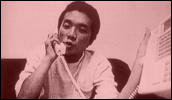Tel-Club
- Year
- 1999
- Original title
- Natsi ni Umareru
- Japanese title
- 夏に生れる
- Director
- Cast
- Running time
- 76 minutes
- Published
- 5 June 2001


by Tom Mes
Here is the new cinema. A democratic cinema, a cinema that is created by regular people, no matter how insignificant. The kind of cinema that Francis Ford Coppola so famously predicted in his "fat girl from Ohio" monologue. All you need is a video camera and an idea.
Tel-Club is a self-portrait of lonely but likeable Kenji Murakami, who records his every step with his video camera. Returning to his hometown to witness the birth of his sister-in-law's first child, he intends to record the event as a video diary. When the new addition to the family refuses to emerge at the expected time, Murakami gets tired of waiting around and decides to look for entertainment. He rides his bicycle into town and finds what he seraches in the shape of tel-clubs, where men pay to have telephone conversations with teenage girls (a true phenomenon closely related to the methods of teenage "paid companionship" portrayed in Masato Harada's 1997 film Bounce Ko Gals).
He manages to make a date, but the girl stands him up. Despite the disappointing results (and because there is absolutely nothing else to do in town), he decides to return to the club and try again. In fact, he returns time and again, as snug in his private cubicle as his still unborn nephew in his sister's womb (the telephone cord as umbilical cord?), and strangely enough growing increasingly confident about his chances with each visit - though results are always as humiliating.
Watching the video-recorded proceedings outlined above really give one the impression that this is indeed the future of filmmaking, a future in which anyone can simply record his daily life and call it cinema. But then, as one wise man once said, not everyone who owns a pen is a writer; slowly, the question of whether what we're watching is actually true or fabricated rears its head. And just when it does, Tel-Club takes a turn and runs off in a totally different and thoroughly absurd fictional direction.
With Tel-Club, Kenji Murakami plays a perfectly orchestrated trick on his audience by using their built-in expectancies about what defines cinema (more precisely: what defines documentary) and what separates recorded fact from fiction. By using the video camera to record himself, the director automatically makes the viewer believe that he or she is watching a documentary or home video - in other words: recorded fact. The about-face that follows is so sudden and so utterly removed from fact and reality, that it leaves that same viewer reeling with shame, or laughing at their own gullibility for eagerly treading into Murakami's trap.
The director's subsequent works have shown an ongoing fascination with exploring the form and implications of the documentary. To Murakami, the documentary is nothing more than a genre - that it should present "truth" is not something he considers a given. Films such as How I Survive in Kawaguchi City and Fujica Single Date have continued to mark Murakami out as one of the most singular (and judging from the work of someone like Live Tape director Tetsuaki Matsue, also one of the more influential) filmmakers working in Japan today.